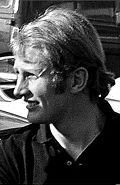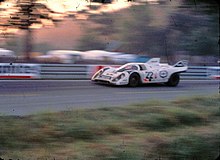Helmut Marko
You can help expand this article with text translated from the corresponding article in German. (October 2024) Click [show] for important translation instructions.
|
Helmut Marko | |||||||||||
|---|---|---|---|---|---|---|---|---|---|---|---|
 Marko at the 2016 Austrian Grand Prix | |||||||||||
| Born | 27 April 1943 | ||||||||||
| Formula One World Championship career | |||||||||||
| Nationality | |||||||||||
| Active years | 1971–1972 | ||||||||||
| Teams | Bonnier, BRM | ||||||||||
| Entries | 10 (9 starts) | ||||||||||
| Championships | 0 | ||||||||||
| Wins | 0 | ||||||||||
| Podiums | 0 | ||||||||||
| Career points | 0 | ||||||||||
| Pole positions | 0 | ||||||||||
| Fastest laps | 0 | ||||||||||
| First entry | 1971 German Grand Prix | ||||||||||
| Last entry | 1972 French Grand Prix | ||||||||||
| |||||||||||
Helmut Marko (born 27 April 1943) is an Austrian former racing driver and motorsport executive, who competed in Formula One from 1971 to 1972. In endurance racing, Marko won the 24 Hours of Le Mans in 1971 with Martini. He founded RSM Marko in 1989, and has been an advisor to Red Bull Racing and its related teams since 2005, winning six World Constructors' Championship titles.
Born and raised in Austria, Marko progressed to sportscar racing by the late-1960s after completing his doctorate in law at the University of Graz. Finding success in the European Touring Car Championship and becoming a class winner at the 1970 24 Hours of Le Mans with Martini, Marko progressed to the premier class the following year and won the race in then-record distance alongside Gijs van Lennep. Less than two months later, Marko debuted in Formula One with Jo Bonnier's Ecurie Bonnier at the German Grand Prix. He joined BRM for the remainder of the 1971 season, and retained his seat in 1972. Marko was seriously injured during the 1972 French Grand Prix, when debris from the March of Ronnie Peterson pierced his visor and left him permanently blinded in his left eye, ending his racing career aged 29.
Since retiring from motor racing, Marko has moved into team and driver management, founding RSM Marko in 1989, which became the Red Bull Junior Team in 1999. With Red Bull, Marko has overseen the development of Formula One World Drivers' Champions Sebastian Vettel and Max Verstappen, and has been an advisor to Red Bull Racing since 2005, winning six World Constructors' Championships with the team.
Early and personal life
[edit]
Marko was born in Graz on 27 April 1943, during Nazi-occupation of Austria. He was a school friend of Jochen Rindt, who later won the Formula One World Drivers' Championship in 1970.[1] Marko graduated from the University of Graz in 1967 with a doctorate in law.[2] Marko owns four hotels in Graz – the Schlossberghotel, Augartenhotel, Lendhotel and Kai 36.
Racing career
[edit]Marko competed in several race series, including 10 Formula One Grands Prix in 1971 and 1972, but scored no World Championship points.
Sportscar racing career
[edit]
He had more success in endurance racing, winning the 1971 24 Hours of Le Mans, driving a Martini-Porsche 917K with Gijs van Lennep. During that year, they set a distance record which remained unbeaten until the 2010 24 Hours of Le Mans (5,335.313 km, at an average of 222.304 km/h - changes to the track reduced the average speed.)

At the Targa Florio, he drove the fastest laps around the 72 km Sicilian mountain circuit in the 1972 race, catching up over two minutes on the leader within two laps to finish second by a mere 17 seconds. His fastest lap in the Alfa Romeo 33 was 33 min 41 sec, at an average of 128.253 km/h.[3]
Formula One career
[edit]Marko debuted in Formula One with Jo Bonnier's Ecurie Bonnier at the German Grand Prix, driving the McLaren M7C. He joined BRM for the remainder of the 1971 season, and retained his seat in 1972. Marko was seriously injured during the 1972 French Grand Prix, when debris from the March of Ronnie Peterson pierced his visor and left him permanently blinded in his left eye, ending his racing career aged 29.
A few weeks after the Targa Florio, during the 1972 French Grand Prix at Clermont-Ferrand, a stone thrown up by Ronnie Peterson's March pierced Marko's helmet visor,[a] permanently blinding his left eye and ending his racing career.[4][5][6][7][8]
Retirement from motor racing
[edit]Marko was the manager for Austrian racing drivers Gerhard Berger and Karl Wendlinger for several years prior to founding RSM Marko in 1989, a racing team who competed in Formula 3 and Formula 3000; running under the name Red Bull Junior Team from 1999 onwards. Since then, he has administered Red Bull's driver development programme, which has seen several drivers progress to Formula One, including Sebastian Vettel, Daniel Ricciardo, Carlos Sainz Jr., Pierre Gasly and Max Verstappen. Marko's Formula One graduates have a combined seven World Drivers' Championship titles between them, with Vettel achieving the first in 2010. Since 2005, he has been an advisor to all Formula One teams owned by Red Bull: Red Bull Racing (2005–present), Toro Rosso (2006–2019), AlphaTauri (2020–2023) and RB (2024–present).[9]
Use of offensive stereotypes
[edit]Marko faced scrutiny in September 2023 for his comments regarding Red Bull Racing driver Sergio Pérez's lack of form throughout the 2023 season, following the Italian Grand Prix. Talking to Red Bull-owned broadcaster ServusTV, he was quoted saying "we know that he has problems in qualifying, he has fluctuations in form, he is South American and he is just not as completely focused in his head as Max Verstappen is, or as Sebastian Vettel".[10][11] Marko's comments were widely perceived as racially charged, with many pointing out that Pérez—a Mexican national—is not South American.[11] Marko apologised on 8 September, stating "I was trying to make a point that [Pérez] has fluctuated in his performance this year, but it was wrong to attribute this to his cultural heritage."[10][12] Pérez accepted Marko's apology on 14 September, despite the FIA reprimanding him the following day.[13][14]
Racing record
[edit]24 Hours of Le Mans results
[edit]| Year | Team | Co-Drivers | Car | Class | Laps | Pos. | Class Pos. |
|---|---|---|---|---|---|---|---|
| 1970 | Porsche 908/2LH | P 3.0 |
335 | 3rd | 1st | ||
| 1971 | Porsche 917K | S 5.0 |
397 | 1st | 1st | ||
| 1972 | Alfa Romeo Tipo 33TT3 | S 3.0 |
232 | DNF | DNF | ||
Source:[15]
| |||||||
Complete British Saloon Car Championship results
[edit](key) (Races in bold indicate pole position; races in italics indicate fastest lap.)
| Year | Team | Car | Class | 1 | 2 | 3 | 4 | 5 | 6 | 7 | 8 | 9 | 10 | 11 | 12 | DC | Pts | Class |
|---|---|---|---|---|---|---|---|---|---|---|---|---|---|---|---|---|---|---|
| 1970 | BMW-Alpina | BMW 1600 | C | BRH | SNE | THR | SIL | CRY | SIL | SIL 7 |
CRO | BRH | OUL | BRH | BRH | 40th | 4 | 14th |
Source:[16]
| ||||||||||||||||||
Complete European Formula Two Championship results
[edit](key)
| Year | Entrant | Chassis | Engine | 1 | 2 | 3 | 4 | 5 | 6 | 7 | 8 | 9 | 10 | 11 | Pos. | Pts |
|---|---|---|---|---|---|---|---|---|---|---|---|---|---|---|---|---|
| 1971 | Ecurie Bonnier | Lola T240 | Ford | HOC Ret |
THR | NÜR 8 |
JAR Ret |
PAL | ROU | 20th | 1 | |||||
| Constructions Mechanique Pygmée | Pygmée MDB16 | MAN Ret |
TUL | ALB | VAL | VAL | ||||||||||
Source:[17]
| ||||||||||||||||
Complete Formula One World Championship results
[edit](key)
| Year | Entrant | Chassis | Engine | 1 | 2 | 3 | 4 | 5 | 6 | 7 | 8 | 9 | 10 | 11 | 12 | WDC | Pts |
|---|---|---|---|---|---|---|---|---|---|---|---|---|---|---|---|---|---|
| 1971 | Ecurie Bonnier | McLaren M7C | Ford Cosworth DFV 3.0 V8 | RSA | ESP | MON | NED | FRA | GBR | GER DNQ |
NC | 0 | |||||
| Yardley-BRM | BRM P153 | BRM P142 3.0 V12 | AUT 11 |
ITA Ret |
CAN 12 |
||||||||||||
| BRM P160 | USA 13 |
||||||||||||||||
| 1972 | Austria-Marlboro BRM |
BRM P153 | BRM P142 3.0 V12 | ARG 10 |
RSA 14 |
ESP | NC | 0 | |||||||||
| BRM P153B | MON 8 |
BEL 10 |
|||||||||||||||
| BRM P160B | FRA Ret |
GBR | GER | AUT | ITA | CAN | USA | ||||||||||
Source:[18]
| |||||||||||||||||
Notes
[edit]- ^ Some older sources, such as ESPN (1972), Motor Sport Retro (2013), The Guardian (2014) and Pitpass.com (2018) state that the stone was thrown up by Emerson Fittipaldi's Lotus, but more recent sources, such as GPBlog (2022), First Sportz (2022), The Sports Rush (2023) and PlanetF1 (2023) indicate that it was thrown up by Ronnie Peterson's March.
See also
[edit]References
[edit]- ^ Völker, Herbert. "The First Formula One Pop Star". The Red Bulletin September 2010. Red Bull Media House GmbH. Retrieved 25 March 2013.
- ^ Völker, Herbert. "Die Diagnosen des Doktors". Zeit Online. ZEIT ONLINE GmbH. Retrieved 27 June 2013.
- ^ 56th Targa Florio 1972, formula2.net, as archived at web.archive.org
- ^ A Era dos Campeões (DVD). Hangar Filmes.
- ^ Williams, Richard (14 November 2010). "Red Bull's Dr Helmut Marko, the mastermind behind Sebastian Vettel". The Observer. London: Guardian News and Media Limited. Retrieved 13 December 2011.
- ^ "Charade". racingcircuits.info. Retrieved 10 April 2017.
- ^ "The Volcanic Rush of Clermont Ferrand". speedhunters.com. August 2013. Retrieved 10 April 2017.
- ^ Tripathi, Gunaditya (26 June 2022). "Helmut Marko reminiscences the fatal accident bringing an end to his promising F1 career 50 years ago". firstsportz.com. Retrieved 23 October 2022.
- ^ "Helmut Marko: Red Bull senior figure will not be suspended after talks with shareholder Oliver Mintzlaff". Sky Sports. 9 March 2024. Archived from the original on 9 May 2024. Retrieved 9 August 2024.
- ^ a b "Helmut Marko apologises for offensive comments about Sergio Perez". ESPN. 9 September 2023. Retrieved 13 October 2024.
- ^ a b "Helmut Marko under huge pressure after 'South American' slur against Sergio Perez". PlanetF1. 8 September 2023. Retrieved 13 October 2024.
- ^ "Red Bull's Helmut Marko apologises for 'offensive remark' about Sergio Pérez". The Guardian. 8 September 2023. Retrieved 13 October 2024.
- ^ "Sergio Perez accepts Helmut Marko apology for ethnicity comment". ESPN. 14 September 2023. Retrieved 13 October 2024.
- ^ "Red Bull's Helmut Marko 'reminded of responsibilities' by FIA over Sergio Perez ethnicity comment". BBC Sport. 15 September 2023. Retrieved 13 October 2024.
- ^ "All Results of Helmut Marko". RacingSportCars. Retrieved 21 October 2019.
- ^ de Jong, Frank. "British Saloon Car Championship". History of Touring Car Racing 1952-1993. Retrieved 23 September 2022.
- ^ "Helmut Marko – Biography". MotorSportMagazine. Retrieved 21 October 2019.
- ^ Small, Steve (1994). The Guinness Complete Grand Prix Who's Who. Guinness. p. 245. ISBN 0851127029.
External links
[edit]- 1943 births
- Living people
- Sportspeople from Graz
- 24 Hours of Le Mans drivers
- 24 Hours of Le Mans winning drivers
- Austrian Formula One drivers
- Austrian motorsport people
- Austrian racing drivers
- BRM Formula One drivers
- Ecurie Bonnier Formula One drivers
- European Formula Two Championship drivers
- Red Bull Racing
- World Sportscar Championship drivers
- Scuderia Toro Rosso
- Porsche Motorsports drivers
